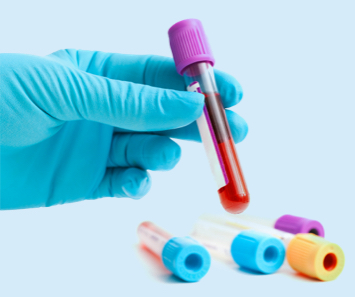Understanding Growth Disorders
Understanding idiopathic short stature
Actor portrayal

What is idiopathic short stature?
In medicine, the word “idiopathic” describes any health condition where the cause is unknown. So, children with idiopathic short stature (ISS) are shorter than other children of the same age, sex, and population group, but doctors can’t identify a specific disorder or other factor that is causing it.
Actor portrayal
Actor portrayal

What are the signs of ISS?
Short stature is often the only feature of ISS. Otherwise, children with ISS have typical birth weights, body proportions, and growth hormone levels.
How is ISS diagnosed?
An ISS diagnosis comes after other causes of short stature are ruled out. These causes could include growth hormone deficiency or genetic disorders. To research possible causes, your child’s doctor may take physical measurements and order lab tests.
Your child may also be referred to a specialist called a pediatric endocrinologist. The specialist may order a stimulation or “stim” test, which measures the level of growth hormone in your child’s body.
If none of the tests point to a specific cause, your child may be diagnosed with ISS.


What’s the stim test?
A stim test measures the body’s ability to release the appropriate amount of growth hormone. The test involves artificially stimulating your child’s pituitary gland. Then your child has a series of blood tests to see how much growth hormone their pituitary gland produces over a period of time.
After the diagnosis
Children diagnosed with ISS may be prescribed growth hormone treatment. This involves taking regular doses of growth hormone to stimulate growth. Your child may have regular follow-up visits to monitor their growth and make sure that treatment is working well.
More resources for your journey
Advocacy and support for patients and families living with ISS and other growth-related disorders
Actor portrayal
Novo Nordisk is committed to helping patients with ISS reach their growth potential
Actor portrayal
Want to learn about another condition?
Childhood GHD
Idiopathic short stature
Small for gestational age
Turner syndrome
Noonan syndrome
Prader-Willi syndrome
Adult GHD
Important Safety Information:
Do not use Norditropin® if:
- you have a critical illness caused by certain types of heart or stomach surgery, trauma or breathing (respiratory) problems
- you are a child with Prader-Willi syndrome who is severely obese or has breathing problems including sleep apnea (briefly stop breathing during sleep)
- you have cancer or other tumors
- you are allergic to somatropin or any of the ingredients in Norditropin®
- your healthcare provider tells you that you have certain types of eye problems caused by diabetes (diabetic retinopathy)
- you are a child with closed bone growth plates (epiphyses)
Before taking Norditropin®, tell your healthcare provider about all of your medical conditions, including if you:
- have had heart or stomach surgery, trauma or serious breathing (respiratory problems)
- have had a history of problems breathing while you sleep (sleep apnea)
- have or have had cancer or any tumor
- have diabetes
- are pregnant or breastfeeding, or plan to become pregnant or breastfeed
Tell your healthcare provider about all the medicines you take, including prescription and over-the-counter medicines, vitamins, and herbal supplements. Norditropin® may affect how other medicines work, and other medicines may affect how Norditropin® works.
How should I use Norditropin®?
- Use Norditropin® exactly as your health care provider tells you to.
- Do not share your Norditropin® pens and needles with another person even if the needle has been changed. You may give another person an infection or get an infection from them.
What are the possible side effects of Norditropin®?
Norditropin® may cause serious side effects, including:
- high risk of death in people who have critical illnesses because of heart or stomach surgery, trauma or serious breathing (respiratory) problems
- high risk of sudden death in children with Prader-Willi syndrome who are severely obese or have breathing problems including sleep apnea
- increased risk of growth of cancer or a tumor that is already present and increased risk of the return of cancer or a tumor in people who were treated with radiation to the brain or head as children and who developed low growth hormone problems. Contact the healthcare provider if you or your child start to have headaches, or have changes in behavior, changes in vision, or changes in moles, birthmarks, or the color of your skin
- new or worsening high blood sugar (hyperglycemia) or diabetes
- increase in pressure in the skull (intracranial hypertension). If you or your child has headaches, eye problems, nausea or vomiting, contact the healthcare provider
- serious allergic reactions. Get medical help right away if you or your child has the following symptoms: swelling of your face, lips, mouth, or tongue, trouble breathing, wheezing, severe itching, skin rashes, redness or swelling, dizziness or fainting, fast heartbeat or pounding in your chest, or sweating
- your body holding too much fluid (fluid retention) such as swelling in the hands and feet, pain in your joints or muscles or nerve problems that cause pain, burning, or tingling in the hands, arms, legs and feet. Tell your healthcare provider if you have any of these signs or symptoms of fluid retention
- decrease in a hormone called cortisol. Tell your or your child’s healthcare provider if you or your child has darkening of the skin, severe fatigue, dizziness, weakness, or weight loss
- decrease in thyroid hormone levels
- hip and knee pain or a limp in children (slipped capital femoral epiphysis). This may lead to a serious condition where bone tissue dies due to a lack of blood supply (osteonecrosis). Get medical help right away if your child develops a limp or has hip or knee pain
- worsening of curvature of the spine (scoliosis)
- severe and constant abdominal pain can be a sign of pancreatitis. Tell your or your child’s healthcare provider if you or your child has any new abdominal pain
- loss of fat and tissue weakness in the area of skin you inject
- increase in phosphorus, alkaline phosphatase, and parathyroid hormone levels in your blood
The most common side effects of Norditropin® include:
- injection site reactions and rashes, and headaches
Please click here for Norditropin® Prescribing Information.
Norditropin® is a prescription medication. You are encouraged to report negative side effects of prescription drugs to the FDA. Visit www.fda.gov/medwatch, or call 1-800-FDA-1088.
What is Norditropin®?
Norditropin® (somatropin) injection 5 mg, 10 mg, 15 mg, or 30 mg is a prescription medicine that contains human growth hormone, the same growth hormone made by the human body.
Norditropin® is given under the skin (subcutaneous) and is used to treat:
- children who are not growing because of low or no growth hormone
- children who are short (in stature) and who have Noonan syndrome, Turner syndrome, or were born small (small for gestational age-SGA) and have not caught-up in growth by age 2 to 4 years
- children who have Idiopathic Short Stature (ISS)
- children who are not growing who have Prader-Willi syndrome (PWS)
- adults who do not make enough growth hormone
What is Norditropin®?
Norditropin® (somatropin) injection 5 mg, 10 mg, 15 mg, or 30 mg is a prescription medicine that contains human growth hormone, the same growth hormone made by the human body.
Norditropin® is given under the skin (subcutaneous) and is used to treat:
- children who are not growing because of low or no growth hormone
- children who are short (in stature) and who have Noonan syndrome, Turner syndrome, or were born small (small for gestational age-SGA) and have not caught-up in growth by age 2 to 4 years
- children who have Idiopathic Short Stature (ISS)
- children who are not growing who have Prader-Willi syndrome (PWS)
- adults who do not make enough growth hormone
Important Safety Information:
Do not use Norditropin® if:
- you have a critical illness caused by certain types of heart or stomach surgery, trauma or breathing (respiratory) problems
- you are a child with Prader-Willi syndrome who is severely obese or has breathing problems including sleep apnea (briefly stop breathing during sleep)
- you have cancer or other tumors
- you are allergic to somatropin or any of the ingredients in Norditropin®
- your healthcare provider tells you that you have certain types of eye problems caused by diabetes (diabetic retinopathy)
- you are a child with closed bone growth plates (epiphyses)
Before taking Norditropin®, tell your healthcare provider about all of your medical conditions, including if you:
- have had heart or stomach surgery, trauma or serious breathing (respiratory problems)
- have had a history of problems breathing while you sleep (sleep apnea)
- have or have had cancer or any tumor
- have diabetes
- are pregnant or breastfeeding, or plan to become pregnant or breastfeed
Tell your healthcare provider about all the medicines you take, including prescription and over-the-counter medicines, vitamins, and herbal supplements. Norditropin® may affect how other medicines work, and other medicines may affect how Norditropin® works.
Important Safety Information:
Do not use Norditropin® if:
- you have a critical illness caused by certain types of heart or stomach surgery, trauma or breathing (respiratory) problems
- you are a child with Prader-Willi syndrome who is severely obese or has breathing problems including sleep apnea (briefly stop breathing during sleep)
- you have cancer or other tumors
- you are allergic to somatropin or any of the ingredients in Norditropin®
- your healthcare provider tells you that you have certain types of eye problems caused by diabetes (diabetic retinopathy)
- you are a child with closed bone growth plates (epiphyses)
Before taking Norditropin®, tell your healthcare provider about all of your medical conditions, including if you:
- have had heart or stomach surgery, trauma or serious breathing (respiratory problems)
- have had a history of problems breathing while you sleep (sleep apnea)
- have or have had cancer or any tumor
- have diabetes
- are pregnant or breastfeeding, or plan to become pregnant or breastfeed
Tell your healthcare provider about all the medicines you take, including prescription and over-the-counter medicines, vitamins, and herbal supplements. Norditropin® may affect how other medicines work, and other medicines may affect how Norditropin® works.
How should I use Norditropin®?
- Use Norditropin® exactly as your health care provider tells you to.
- Do not share your Norditropin® pens and needles with another person even if the needle has been changed. You may give another person an infection or get an infection from them.
What are the possible side effects of Norditropin®?
Norditropin® may cause serious side effects, including:
- high risk of death in people who have critical illnesses because of heart or stomach surgery, trauma or serious breathing (respiratory) problems
- high risk of sudden death in children with Prader-Willi syndrome who are severely obese or have breathing problems including sleep apnea
- increased risk of growth of cancer or a tumor that is already present and increased risk of the return of cancer or a tumor in people who were treated with radiation to the brain or head as children and who developed low growth hormone problems. Contact the healthcare provider if you or your child start to have headaches, or have changes in behavior, changes in vision, or changes in moles, birthmarks, or the color of your skin
- new or worsening high blood sugar (hyperglycemia) or diabetes
- increase in pressure in the skull (intracranial hypertension). If you or your child has headaches, eye problems, nausea or vomiting, contact the healthcare provider
- serious allergic reactions. Get medical help right away if you or your child has the following symptoms: swelling of your face, lips, mouth, or tongue, trouble breathing, wheezing, severe itching, skin rashes, redness or swelling, dizziness or fainting, fast heartbeat or pounding in your chest, or sweating
- your body holding too much fluid (fluid retention) such as swelling in the hands and feet, pain in your joints or muscles or nerve problems that cause pain, burning, or tingling in the hands, arms, legs and feet. Tell your healthcare provider if you have any of these signs or symptoms of fluid retention
- decrease in a hormone called cortisol. Tell your or your child’s healthcare provider if you or your child has darkening of the skin, severe fatigue, dizziness, weakness, or weight loss
- decrease in thyroid hormone levels
- hip and knee pain or a limp in children (slipped capital femoral epiphysis). This may lead to a serious condition where bone tissue dies due to a lack of blood supply (osteonecrosis). Get medical help right away if your child develops a limp or has hip or knee pain
- worsening of curvature of the spine (scoliosis)
- severe and constant abdominal pain can be a sign of pancreatitis. Tell your or your child’s healthcare provider if you or your child has any new abdominal pain
- loss of fat and tissue weakness in the area of skin you inject
- increase in phosphorus, alkaline phosphatase, and parathyroid hormone levels in your blood
The most common side effects of Norditropin® include:
- injection site reactions and rashes, and headaches
Please click here for Norditropin® Prescribing Information.
Norditropin® is a prescription medication. You are encouraged to report negative side effects of prescription drugs to the FDA. Visit www.fda.gov/medwatch, or call 1-800-FDA-1088.
What is Norditropin®?
Norditropin® (somatropin) injection 5 mg, 10 mg, 15 mg, or 30 mg is a prescription medicine that contains human growth hormone, the same growth hormone made by the human body.
Norditropin® is given under the skin (subcutaneous) and is used to treat:
- children who are not growing because of low or no growth hormone
- children who are short (in stature) and who have Noonan syndrome, Turner syndrome, or were born small (small for gestational age-SGA) and have not caught-up in growth by age 2 to 4 years
- children who have Idiopathic Short Stature (ISS)
- children who are not growing who have Prader-Willi syndrome (PWS)
- adults who do not make enough growth hormone
